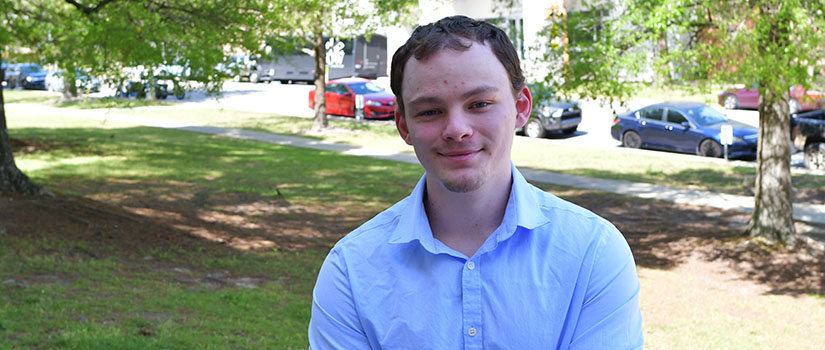Mechanical engineering graduate student Jason Smith was selected last month for a Science, Mathematics and Research for Transformation (SMART) fellowship. Funded by the Department of Defense (DoD), the SMART program is a combined education and workforce development opportunity for STEM students and provides the tools to pursue higher education and begin a rewarding career with the DoD. The SMART fellowship will provide a stipend and cover Smith’s tuition. After receiving his graduate degree next spring, Smith is required to work with the DoD for at least one year.
"Jason is an excellent candidate for this award and the entire group was excited when he got it,” says Mechanical Engineering Professor Austin Downey. “Jason has been working on Navy research with my group since his junior year, has done multiple summer research rotations with the Navy, and has demonstrated excellent capabilities with hands-on and numerical work. I could not think of someone more deserving of this than Jason.”
As part of the fellowship, Smith will work on his research, “Multi-event Model Updating for Ship Structures with Resource-Constrained Computing.” It will include building and implementing aspects of a digital twin, a complete, cyber-like representation of a system with condition tracking through a smart beam implementation.
Why were you interested in applying for the SMART fellowship?
You have more funding and freedom to work on your own project with fellowships. I chose the SMART fellowship because I’ve previously interned [virtually] with the Navy at the Carderock Division. I love the people there, and this fellowship is another way of wanting to work with them. I spent a lot of time rewriting my SMART application with the hope that I would get the specific spot where I've been working the past two summers.
What were some of your research activities that helped prepare you for the SMART program?
When I first came to Dr. Downey in 2019, I told him that I wanted to do something but didn't know what it was. Afterward, I was put on various projects with different tasks to introduce new engineering implementations. Through this process, I learned what I did and didn’t like, which eventually led to work with the Navy during the summer.
In the first year of my internship in 2020, I did some small stuff before helping him build a Finite Element Analysis (FEA) model, which is a computer model of a physical structure. I used Abaqus software for my FEA model; however, the Navy couldn’t answer my specific questions because they used a different program. Instead, they helped me go through the thought process to properly build the model in the Abaqus software. It was self-learning and answering questions that no one knew the answer to. Last summer, even though I couldn’t work with Dr. Downey, I went back to the Navy [virtually] and worked with the same mentor and people. But I still asked Dr. Downey questions, and we bounced ideas back and forth.
What type of research will you be doing as part of the fellowship?
“It will still be the same area of research I’ve done. Even if the project, structure or workplace changes, it's the same methodologies and techniques. Right now, I'm working on model analysis, and getting model shapes of how structures bend and reacts to certain frequencies. The Navy might tell me that they’re interested in something similar or go in a different direction with research that’s tailored more to what they do. But it’s still the same research and methodology no matter what changes.
What have you learned through all of your research while working towards the fellowship?
“If you don't like your project, nothing will get done. I've seen many people get stuck on projects or certain steps and it’s much harder for them. It happens in every project, but if you don't like it, its 10 times worse. You need to like the project or at least be open to learning since you don't know everything.
What are you looking forward to as a recipient of the DoD SMART Fellowship?
Freedom is probably the best way to describe the Navy and the SMART fellowship in general. You get to do what you want, within limitations of course, but it's very hands off. You have more freedom working on your own project instead of a professor’s research. This fellowship is just another step for trying to prove myself. I know I’ll be there [Navy Carderock Division] for at least a year after I graduate, and hopefully I’ll stay there for a really long time. They're very open to moving people around, and this fellowship gets me in the door. There's a lot of opportunities, but since there may not be openings, which was a big reason why I went after the fellowship. It’s just a better situation overall, including working with the Navy at Carderock for a year after I graduate.
What are your plans after earning your master’s degree?
I'm contracted with the fellowship to work with the DoD for at least a year. My research will be the same but on different structures, components and methods. Ever since my first summer, I always wanted to work there. Going after the fellowship was just another way to be able to work there for a year, and many people choose to stay after their contracted period. I’m confident I’ll stay after the contract is over since each internship experience is better than the previous.
